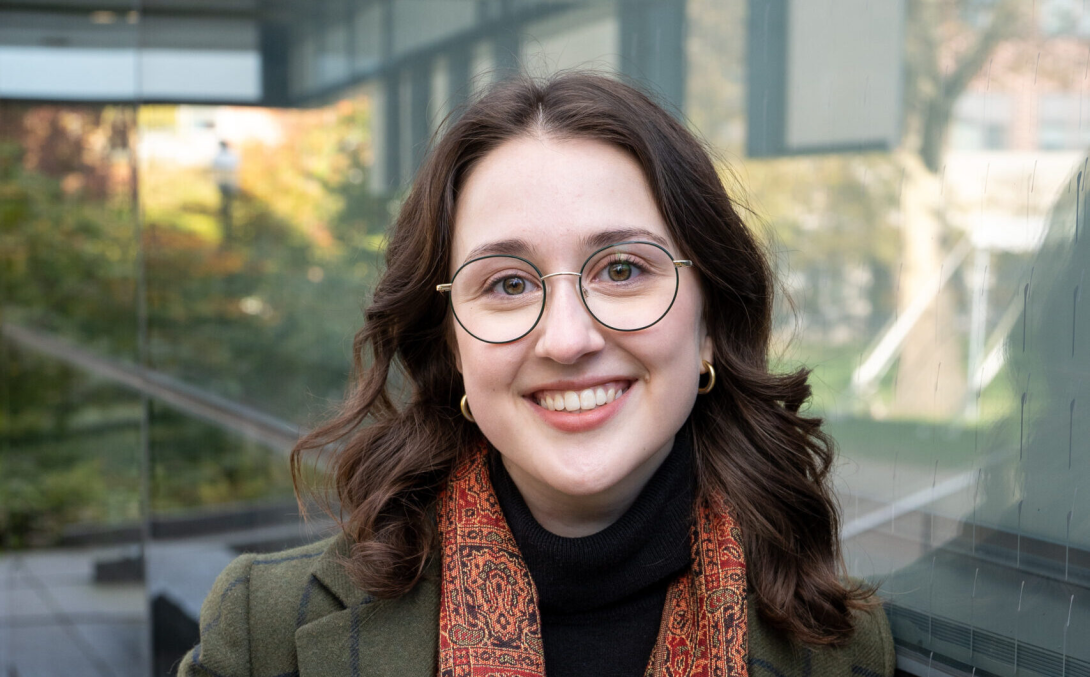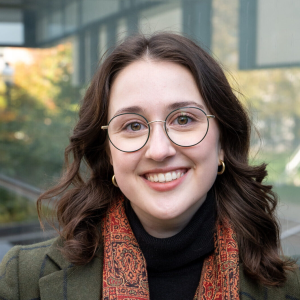
Artificial intelligence (AI) has been making headlines for years. Industries ranging from politics to book publishing are still trying to fully understand AI, its various capabilities, and—above all—how it can be used effectively and ethically.
Journalism, an industry driven by ethics and integrity, is particularly vulnerable to the potential misuse of AI. In her current role as a researcher leading the Platforms and Publishers project at Columbia University’s Tow Center for Digital Journalism, Lehigh University alumna Klaudia Jaźwińska '18 examines how news publishers are navigating relationships with technology companies, particularly regarding their implementation and coverage of AI. She credits many of the journalistic and research skills she honed at Lehigh with helping her in this work.
Jaźwińska possessed an innate sense of curiosity and love of storytelling from a young age, although she never imagined those traits would lead to a career. “As a kid, I didn’t understand journalism was a thing I could do as a job,” Jaźwińska recalls. “I saw people on the news and didn’t think it was something I could do. But my mother recognized my curiosity, inquisitiveness, and sense of justice and felt I had a potential to be a journalist.” The love of not only telling stories but finding the truth at their heart is taking her career in a different direction than she ever imagined. She is drawn to the storytelling aspect of journalism, as well as its ability to help give voice to people who may not otherwise be heard, and holding power to account. “I think that deserves to be protected, especially at a time when so many journalists are losing their jobs and newspapers are shutting down. Journalism has such an important role in our democracy,” she said.
Armed with her passion for news and desire for truth, Jaźwińska’s journalism career began in earnest at Lehigh. She liked the university’s size and variety of academic programs. “I wanted to major in journalism and global studies. Both were available at Lehigh. One facet of their journalism program that I liked is that Lehigh wants journalism graduates to have a double major and be multifaceted so they can bring different elements to their reporting,” she recalls. “Also, I came from a really small town. It would have been daunting to go to a large school. So coming to Lehigh got me out of my comfort zone, but it wasn’t so big I felt I would be lost in the shuffle.” Meeting journalism professors like Jeremy Littau and Jack Lule prior to committing helped solidify her decision to attend Lehigh.
It started with the Brown & White
Jaźwińska immediately jumped in and got involved with The Brown and White, Lehigh’s student newspaper. She served as community engagement editor her freshman year, assumed reporter and photographer duties, and worked her way up to managing editor and editor-in-chief by her senior year. She was also involved with other programs at Lehigh, like the Global Union and Lehigh’s United Nations (UN) partnership, where she served as a youth representative for a public health NGO. “I’m so grateful I got to be as involved as I was, especially with journalism,” she recalls. “You learn more by doing—there’s only so much you can learn in a classroom.”
Participating in the Mountaintop Project, however, proved to be the turning point in her academic career and set her professional course. “My interest in the relationship between technology and journalism was seeded before my senior year. I was involved in a Mountaintop Project and spent the summer working on a research project at Lehigh’s Mountaintop campus,” she explains. “Jeremy Littau was my advisor. My team and I worked on investigating the question of whether, and how, people’s social media feeds informed their political decision-making. This was before the news about Cambridge Analytica came out.” Her team studied how algorithms and filter bubbles and might shape the kind of information users are exposed to. This sparked her interest in studying the intersection of tech and journalism.
After graduating from Lehigh, Jaźwińska was awarded a Marshall Scholarship that provided her with two years of funding to pursue graduate studies in the United Kingdom. For the first year, she studied computational and data journalism at Cardiff University in Wales, though at times she found the curriculum to be frustrating. “While I was doing this degree, I was handed data sets in class and told to tell a story about the data. I would ask the professor, ‘Where did this data come from?’, and tried to dig into the dataset to learn more about why it was collected, by whom and for what purpose. My professor didn’t really want me to do that—he just wanted me to do the assignment. Those disagreements piqued my curiosity about data justice,” she said. Though she had planned to spend her second year studying international relations, she petitioned the Marshall Scholarship to pursue a different program than she had originally proposed—a master’s degree in data and society within the Department of Media and Communications at the London School of Economics. Her new degree equipped her with the theoretical and empirical skillset to evaluate the social, political, and cultural contexts of contemporary data production and analytics. Jaźwińska was interested in the role journalists should play in examining the social implications of “datafication”. “For instance, governments might use data to develop algorithms that determine the distribution of resources, or a police department might use it for predictive policing.” These kinds of automated decision-making systems can be dangerous if the data is not adequately representative of the groups it is used to make decisions about, or if its use perpetuates biases or stereotypes.
The rise of ChatGPT and generative AI tools raised important conversations in many contexts—from the newsroom, to the classroom, to the boardroom – about authorship, integrity, and acceptable usage. Jaźwińska says journalists are having many conversations regarding acceptable usage of these tools. “I don’t think many journalists used AI until ChatGPT came out, and now there is a lot of discussion around where it is appropriate to use it,” she explains. “Some publications have used generative AI to produce articles without any kind of disclaimer, which raised alarm bells for audiences.” She said AI can be helpful for certain back-end tasks, such as transcribing interviews with sources or for certain data analysis tasks, but it is highly discouraged for actually writing news stories for a range of reasons, including concerns about plagiarism, intellectual property and “hallucination” (when an AI chatbot generates inaccurate information but presents it as correct). “There is a lot of back and forth going on right now about ethics,” she said. For example, there are disagreements in the industry about whether it is appropriate to use AI tools for tasks like copyediting, augmenting multimedia content, or generating illustrations. In addition to the issues of trust and accountability, there are also concerns about whether AI might “replace” journalists.
Jaźwińska has come back to campus to speak to journalism students about the current discussions happening in the field. In September, she gave a talk on the topic in the Multimedia Storytelling class co-taught by Littau and Professor Matt Veto, and visited The Brown and White’s newsroom to lead a workshop on developing a newsroom AI policy. In March, Jaźwińska, Veto, and the newspaper’s two current and former editors in chief presented on the experience at a panel at the College Media Association Convention titled “Your Newsroom Needs a Policy on AI”. Jaźwińska has found engaging with student journalists to be fulfilling and said that it has unlocked an interest in teaching for her.
Exploring media, technology, and ethics
As a researcher at the Tow Center, Jaźwińska is continuing the work she started at the Mountaintop Campus by examining the complicated relationship between technology companies and news publishers. Like social media platforms did in the past, companies like OpenAI are now looking to establish partnerships with newsrooms. Jaźwińska and her colleagues are exploring how news organizations balance the pressure to embrace the news technology while maintaining their editorial independence and ensuring the sustainability of their business models. “The question for news companies is, ‘If I partner with an AI company, what am I agreeing to?’” she explains. Furthermore, given that every industry is probably having serious discussions about whether to use AI and how to do so, she thinks it’s critical for journalists to be equipped to report well on the social impacts of the technology, without perpetuating “doom” or “hype” narratives.
Jaźwińska feels fortunate to be working as a media and technology researcher at such an interesting time. In many ways, AI represents a critical juncture for journalism and the the information ecosystem at large. Her current role is the perfect blend of her interests, and she hopes to continue to work at this intersection. “I do think I want to continue to be journalism-adjacent for as long as I can. I care about the field a lot,” she said. “I want to make sure it’s serving the best interests of the public. I want to be part of these important conversations.”
When she finished her graduate studies in 2020, COVID was at its peak, downsizing was rampant, and hiring freezes were common. “It was a bad time to search for a job in any field, and particularly in journalism. Though I had hopes of working as a reporter, I had to figure out how to use my skills and interests in a way that’s slightly different than I intended. I realized there are parallels between research and journalism, and that I could apply my skill set in a slightly different context. If my interest in research hadn’t been seeded at Lehigh, I’m not sure I would’ve had the confidence to pursue this role. I have the best of both worlds—working in journalism as a researcher. I feel I landed on my feet a little in a very precarious time in the industry.”
Spotlight Recipient

Klaudia Jaźwińska
Alumna
